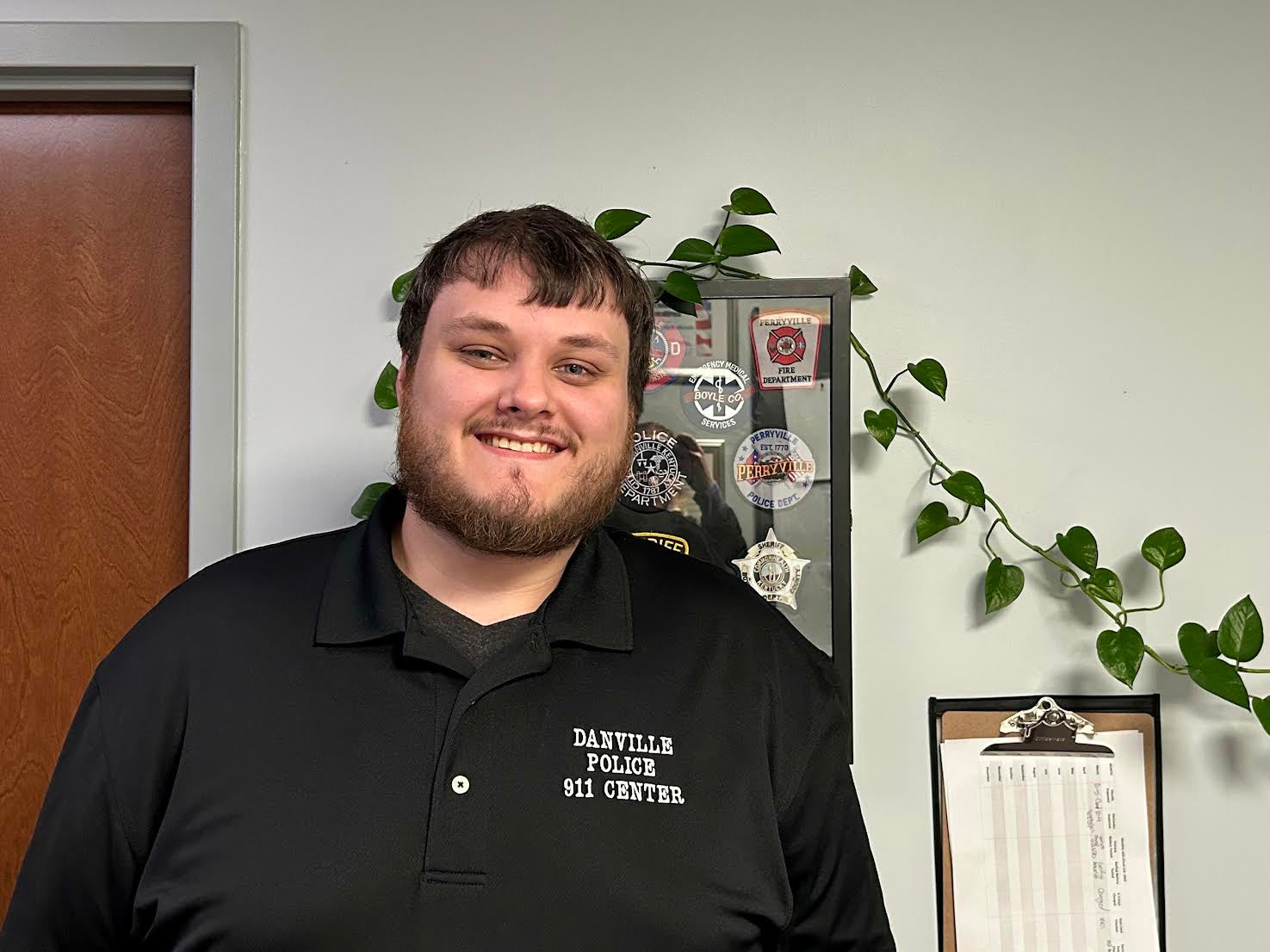911 operator enjoys helping people
Published 3:37 pm Monday, April 10, 2023

- 911 Operator Matthew Sparks at the Danville Center. Photo by Fiona Morgan
Taking calls at the 911 center is no easy job. It requires courage, sacrifice, a knack for multi-tasking and a desire to help people, according to 911 Operator Matthew Sparks.
This week is National Telecommunicators Week from April 9 to 15. Every year at the Danville 911 Center, the city celebrates and thank their operators with different foods and awards throughout the week.
Originally from Garrard County, Sparks started at the Danville 911 Center in 2016. He left in 2017 to work in Garrard County, but came back because he likes Danville. He is the only male operator at the Danville center.
Sparks began the job as a stepping stone for becoming a police officer, but once he settled in, he enjoyed it and wanted to stay.
“I still want to be a police officer, but that probably won’t happen for a little bit, I enjoy it too much here,” Sparks said.
Working in law enforcement runs in his family. His dad was a corrections officer, his grandfather is a veteran and his great-grandfather was sheriff in Garrard County.
“I felt like it runs in my blood; I enjoy listening to the war stories my grandpa told, and I enjoy helping people and making my own stories,” Sparks said. “One of the things I like doing is coming in, trying to make the best difference that I can here, and knowing that I did it to the best of my ability when I go home.”
Although he enjoys helping people, Sparks said that taking the difficult calls can be tough. He uses some mental compartmentalization to leave the stress and emotions at the job.
“You can’t take it home with you. You have to leave it here,” Sparks said. “It can be hard, but it’s leaving home at home and leaving work at work.”
Melinda Butler, 911 Center Assistant Director, said that many operators deal with post-traumatic stress disorder from hearing the worst parts of people’s lives. She said operators talk with each other about tough calls and lean on each other.
Sparks said he also uses stress relief techniques, like spending time with family, and hobbies like video games and music.
“There’s a lot of stuff that you can let affect you if you take it with you, and it can really break a person down if you’re not careful,” Sparks said.
Another sacrifice comes in the form of working long, odd hours. Butler said they miss family time like birthdays, holidays, weekends, baseball games, etc. She has almost never celebrated her kids’ birthdays on their birthday. But she said her kids know that family time is when they make it.
“We’re used to missing meals or eating on the run,” Butler said, adding that operators always bring in snacks and food. Their office has a major food stash, in case they get stuck for long hours or even days.
Operators sometimes get stuck at work during major weather events, like snowstorms, ice storms, flooding, or wind storms. The center gets overwhelmed with calls when something major happens.
During the recent wind storm, Butler said they had 40 calls on the screen within 15 minutes and only three operators. On a normal day, they average about 10 calls per hour. After Butler asked for help, several operators came in to help answer calls.
Operators are always multitasking, going between talking to different people and doing different things at once. Butler said not everyone can do the job, but they can teach people to multitask through their extensive six-month training program.
They train operators on the phones first, then paperwork, then radio, then on doing it all at the same time. New people also have to learn the geography of the area, study maps and see where all the roads in Danville are.
Butler said the street signs in Danville can be confusing, so they ask people who are calling what landmarks and businesses are around them. Instead of having to find a street name, callers can say they are near Lowes, for example.
Butler recently made an informational pamphlet about calling 911 for Centre College students, the library, visitors center, and anyone else who might want one. She said sometimes students call their parents when there’s an emergency, and their parents call 911, and it’s hard to figure out what’s going on. She said people in emergencies should always call 911 directly.
The center will soon be launching a text 911 service, which has been a long time in the making. Butler said that cell phones have changed the business and increased calls.
“It used to be on average, everybody only called 911 only once in their life, now that’s not true. Some people call every week,” Butler said.
Now that everyone has a cell phone, more people call in. Butler said for example, if there’s an accident on the bypass, many people driving by, and the businesses, call in about it. Operators sometimes go through many calls to talk to the ones who are actually involved.
The center sometimes has a lot of turnover, but several people have stayed for many years. Butler has worked there for 18 years. She said they are always happy to educate people about the job and are always looking for applicants.






